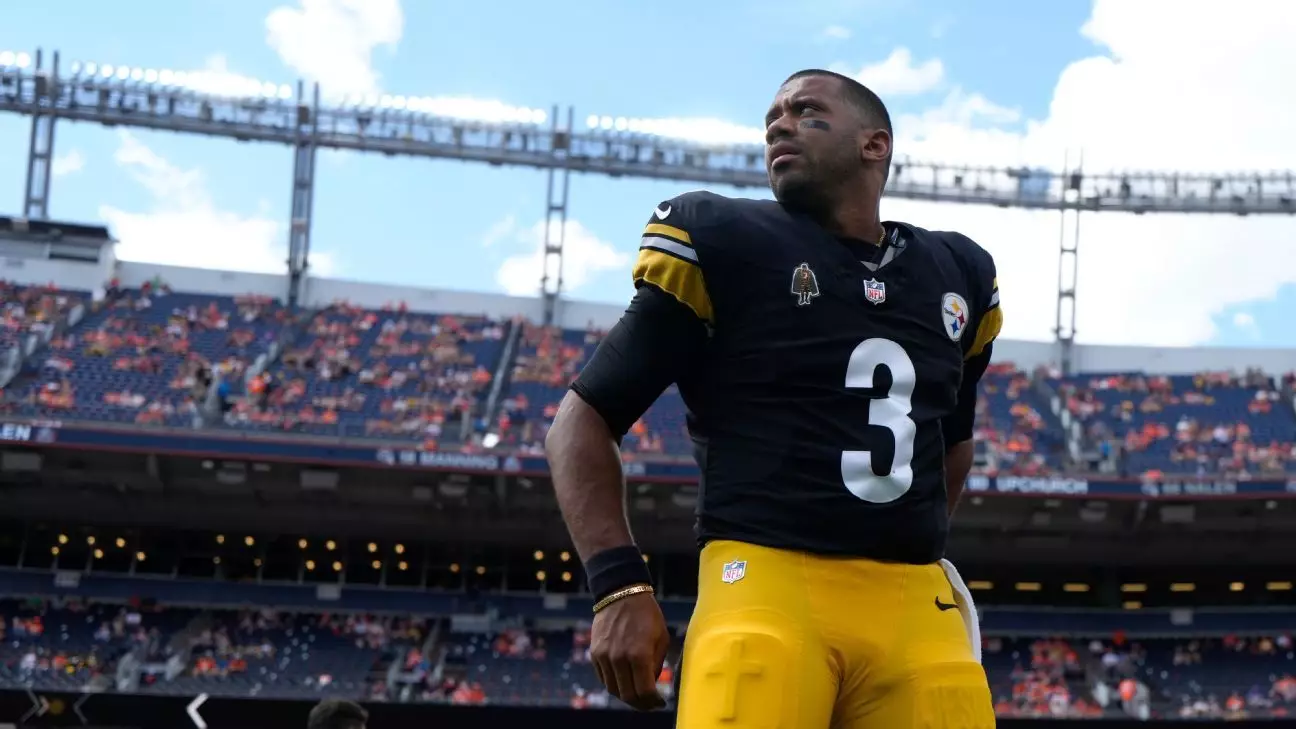In an unusual twist during the Pittsburgh Steelers’ victory over the Denver Broncos, quarterback Russell Wilson did not take a single snap, yet he was presented with a “petty game ball” by head coach Mike Tomlin. This honor, typically reserved for situations where players face their former teams, illustrates not only the emotional weight of Wilson’s return to Denver but also the underlying politics of professional football. Wilson’s situation with the Broncos, a franchise he once hoped to lead to greatness under a hefty contract, ended unceremoniously. The dynamics that surrounded his departure—contract disputes, performance issues, and ultimately being benched—added layers of complexity to his reunion with the team that once invested so heavily in him.
Quarterback Justin Fields aptly noted, “I think we all know Russ got kind of did dirty last year.” This statement encapsulates the shared sentiment among players that while Wilson’s performance might have faltered in Denver, the manner of his exit left a bitter taste. The game ball, therefore, became a symbol of redemption, not just for Wilson but also for the Steelers’ roster, which included players like Brandon Johnson and Corliss Waitman—former Broncos—who also received this unique accolade. This camaraderie among players reinforces the notion that within the competitive realm of the NFL, personal experiences and relationships often transcend the game itself.
Despite being sidelined due to an aggravated calf injury, Wilson made his presence felt on the field leading up to the game. Arriving more than three hours early, he engaged in warmups and took the time to connect with both current and former coaches as well as players. The imagery of Wilson throwing passes while accompanied by Steelers staffers speaks volumes about his enduring passion for the game, and it illustrates the human side of athletes often overshadowed by the pressures of performance. The brief interactions with Broncos players like Bo Nix showcased the personal connections that last, even amid the cutthroat nature of professional sports.
Interestingly, Wilson had downplayed his return to Denver, stating, “It’s always about relationships.” His focus on relationships versus rivalry reveals a deeper understanding of what the game represents beyond the immediate metrics of wins and losses. This narrative of reestablishing connections contrasts sharply with his contentious exit from the Broncos, suggesting a healing process. Wilson’s ability to compartmentalize emotions during his time in Denver may serve him well, but it also raises questions about the toll of such experiences on a player’s psyche.
While Wilson remained an observer during this encounter, Fields stepped into the spotlight, leading the Steelers with a blend of promise and inconsistency. His performance began strongly with 10 completions out of 12 attempts for 101 yards and a touchdown. However, the second half presented challenges as the team struggled to maintain momentum. Such variability in performance isn’t uncommon, especially playing against formidable defenses in intense environments. Fields acknowledged the difficulties, stating, “It’s hard to win in this league, especially on the road in these hostile environments.” His reflections highlight a fundamental truth about professional football—the constant struggle to adapt and overcome obstacles.
The juxtaposition of Wilson’s sidelined status against Fields’ on-field endeavors accentuates the different paths both quarterbacks face. While one observes and reflects on relationships and past grievances, the other navigates the immediate complexities of game strategy and execution. This contrast serves as a microcosm of the broader narrative within sports, where trajectories diverge based on circumstances that often feel beyond the players’ control.
Overall, the matchup between the Steelers and Broncos serves as a reminder that the NFL is driven by more than just stats and scores—the emotional landscape of players is equally significant. Wilson’s “petty game ball” symbolizes resilience and camaraderie, while Fields’ performance encapsulates the struggles of navigating a highly competitive league. In moments like these, fans and players alike are reminded that behind the facades of competition lie stories of connection, recovery, and the relentless pursuit of excellence. Ultimately, this encounter illustrates that football is not merely a game; it is a complex tapestry woven from the threads of personal triumphs, tribulations, and the enduring spirit of teamwork.


Leave a Reply